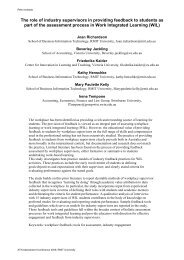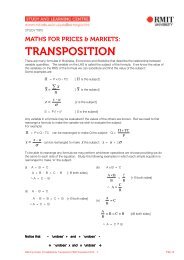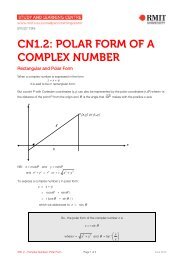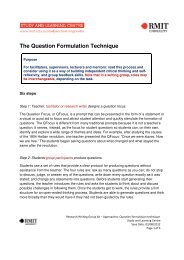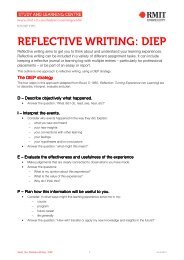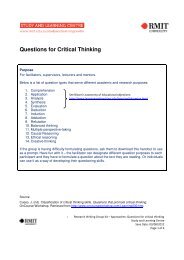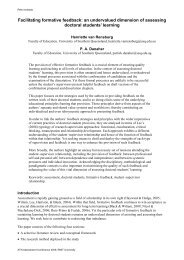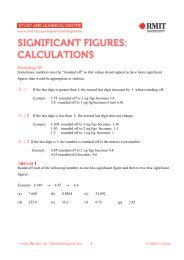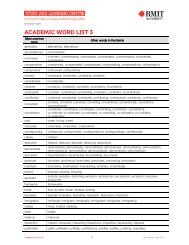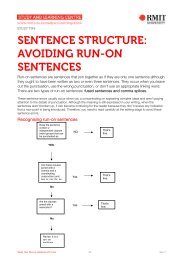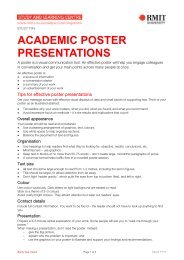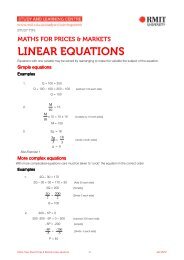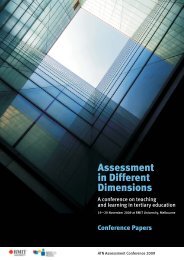student feedback and leadership - Office for Learning and Teaching
student feedback and leadership - Office for Learning and Teaching
student feedback and leadership - Office for Learning and Teaching
You also want an ePaper? Increase the reach of your titles
YUMPU automatically turns print PDFs into web optimized ePapers that Google loves.
Part B: Building Leadership Capacity - SET: Mathematics & Geospatial Sciences ART Report<br />
MATH2114<br />
Both math <strong>and</strong> stats components changed to 60% exam <strong>and</strong> 40%<br />
assessments. The stats component changed to 60% final exam, 30%<br />
weblearn tests ( one test every 3 weeks starting from week 4) <strong>and</strong> 10%<br />
on 10 weekly problems <strong>and</strong> 10 Lab assessments ( 1 marks per week <strong>for</strong><br />
10 weeks starting from week 2). Their weekly problems <strong>and</strong> lab assessments<br />
were marked <strong>and</strong> returned to them. We also removed the quiz attempts <strong>and</strong><br />
replaced it with 10 attempts on each test. This was requested through their<br />
feed back comments as well as in their <strong>student</strong>’s consultation meeting in their<br />
home departments. However the pass rate on the weblearn tests were pushed<br />
up to 80% which required them to have more attempts till they completely<br />
understood the material. We also added another 250 questions to the<br />
question bank bringing the total number of questions to 500.<br />
We also added a 10% optional assignment “to design” a practical problem<br />
in their respective field which can be solved using topics discussed in the<br />
course. It was also emphasized that they must use real data from their field<br />
to design the problem. More than 30 <strong>student</strong>s took up the challenge. Some<br />
of the projects were very well-designed <strong>and</strong> very interesting. They were asked<br />
to use real examples <strong>and</strong> real data from their own discipline. The feed back<br />
was positive in that they could feel the importance of the course <strong>and</strong> the<br />
reason <strong>for</strong> having it as a compulsory course in their discipline.<br />
A few staff tried to use more online assessment to improve the feed back<br />
issues. The analysis clearly shows that <strong>for</strong> some of our courses the score<br />
on the CES feed back has improved.<br />
Other staff in the school were in<strong>for</strong>med about the analysis <strong>and</strong> the good<br />
practices through staff meetings at different times of the year <strong>and</strong> were<br />
encouraged to adopt the positive practices that were proved successful.<br />
MATH1277<br />
Detailed analysis of the <strong>student</strong>s’ per<strong>for</strong>mance on the Math1275 final exam<br />
identified several factors that appeared to affect the <strong>student</strong> per<strong>for</strong>mance,<br />
including the placement of the correct answer, the wording of the question<br />
(positive or negative style) <strong>and</strong> the number of available responses. The first<br />
topic test was redesigned to attempt to counter these affects with a reasonably<br />
high degree of success. Students were provided with detailed verbal <strong>feedback</strong><br />
on the test <strong>and</strong> were invited to discuss their underst<strong>and</strong>ing of the questions<br />
<strong>and</strong> available responses. In<strong>for</strong>mation gained through this process was used<br />
in designing both the second topic test <strong>and</strong> final exam in an ef<strong>for</strong>t to obtain<br />
a more accurate measure of the <strong>student</strong>’s abilities.<br />
The computer lab exercises were also refined, particularly <strong>for</strong> the Bundoora<br />
campus <strong>student</strong>s. The exercises were collected, marked <strong>and</strong> returned with<br />
detailed comments to assist in future per<strong>for</strong>mance. The sixth lab session<br />
was altered to become a collective revision of all previous exercises <strong>and</strong> topics.<br />
These lab exercises will be further refined next year <strong>and</strong> become optional<br />
exercises with the 10% assessment component being assigned to two small<br />
computer projects. These two projects, based on research literature from their<br />
discipline, will contextualise <strong>and</strong> summarise the skills learnt from the exercises<br />
<strong>and</strong> lectures <strong>and</strong> allow <strong>for</strong> greater flexibility in facilitating <strong>student</strong> learning.<br />
Page 139



